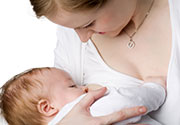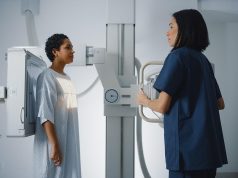Strongest benefit seen in most common types of tumors, researchers say
WEDNESDAY, April 29, 2015 (HealthDay News) — Women who breastfeed their babies and later develop breast cancer are less likely to have the cancer return or be terminal than women who do not breastfeed, new research shows. The study was published online April 28 in the Journal of the National Cancer Institute.
“We found in this study of over 1,600 women with breast cancer that those who previously breastfed had a 30 percent overall decreased risk of their breast cancer recurring,” study leader Marilyn Kwan, Ph.D., a research scientist at the Kaiser Permanente division of research in Oakland, Calif., told HealthDay. “We also found those who previously breastfed had a 28 percent reduced risk of dying from their breast cancer.”
Kwan’s team looked at two groups of women, some diagnosed from 1997 to 2000 and others diagnosed from 2006 to 2013. The researchers found an association between breastfeeding and a more favorable outcome for breast cancer patients. The investigators found the link to be statistically significant with luminal A subtype breast cancers, including estrogen receptor-positive. However, they did not find the link to be statistically strong for other subtypes of breast cancer. While Kwan found an overall 30 percent reduced risk of breast cancer recurrence among those who breastfed, when they took the length of breastfeeding into account, any duration decreased risk, but the link was not as strong for those who did so for less than six months.
The American Academy of Pediatrics (AAP) recommends exclusive breastfeeding for about six months, followed by continued breastfeeding as foods are introduced, for up to a year or longer. Breastfeeding helps protect babies from diseases such as diabetes, from infection, and from becoming overweight. Mothers who breastfeed have a lower risk of developing breast and ovarian cancers, according to the AAP.
Copyright © 2015 HealthDay. All rights reserved.








